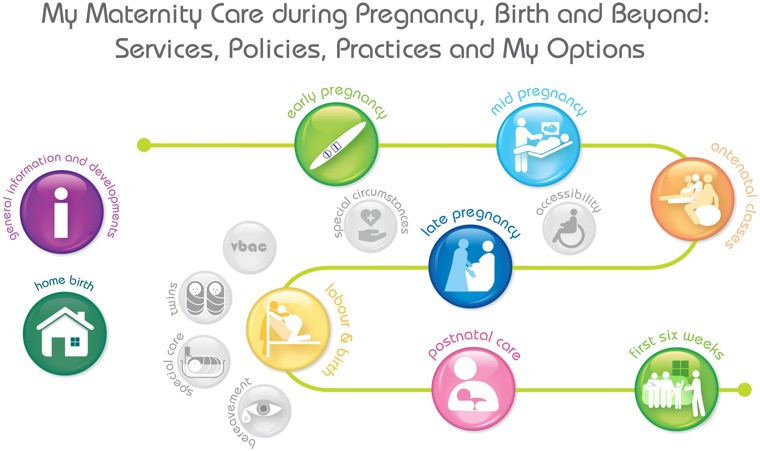Show Popup
General Information and Developments
How many beds are in my local unit?
The size of maternity units varies from small departments within general hospitals to very large stand-alone maternity hospitals.
The two midwifery-led units are the smallest units, with 2 rooms in Cavan and 3 rooms in Our Lady of Lourdes.
| Public: |
|
| Semi-private: |
|
| Private: |
|
How many midwives, doctors and consultants work at my local unit?
Midwives provide most of the care during pregnancy, labour, birth and after the birth. Therefore, they far outnumber obstetricians. Midwives are the key expert professionals for care throughout a normal pregnancy and a straightforward labour, and in some units women have the option of attending midwife-only clinics and receiving midwife-only care throughout.
In other units women automatically see a doctor as well as a midwife at every visit.
In addition, maternity units typically have anaesthetists, paediatricians and neonatologists to provide care when necessary.
| Midwives: |
|
| Consultant obstetrician/gynaecologist: |
|
| Consultant paediatricians/neonatologists: |
|
| Consultant anaesthetists: |
|
| Non-consultant hospital doctors (junior doctors, SHO, registrars): |
|
How many babies are born in my unit each year?
This varied from less than 150 births in Cavan midwifery-led unit (MLU) to over 9,000 births in NMH (Holles St) in 2014 and 2015. We asked for the total number of mothers – 64,000 – as well as the total number of babies born – 67,700. We also asked for the split between mothers having their first baby and mothers having their second or subsequent baby.
More recent figures from the Maternity Patient Safety Statements (MPSS) show slightly lower numbers of women giving birth (approximately 60,700) and babies being born (approximately 61,900).
More information is available in our statistics section of the site.
For 2014, from our detailed statistics survey
| No. of mothers (total) |
|
| No of first-time mothers |
|
| No. of second- and subsequent-time mothers |
|
| No. of babies born to all mothers |
|
| No. of babies born to first-time mothers |
|
| No. of babies born to second-and subsequent-time mothers |
|
From the MPSS
| No. of mothers (total) 2016 |
Show All |
| No. of babies (total) 2016 |
Show All |
| No. of mothers (total) 2017 |
Show All |
| No. of babies (total) 2017 |
Show All |
How many twins, triplets & quads are born in my local unit?
A multiple pregnancy is considered a complex pregnancy, and although all 19 maternity units provide care for twin pregnancies, not all provide maternity care for the more complex cases. Triplets are always born in select maternity units with the appropriate expertise and services.
Twin pregnancy care does not fall within the scope of the 2 midwifery-led units in Ireland.
Multiple births from our survey for 2014 and 2015 are given below.
| Twins (sets) 2014 |
|
| Triplets (sets) 2014 |
|
| Quads (sets) 2014 |
|
| Other 2014 |
|
| Twins (sets) 2015 |
|
| Triplets (sets) 2015 |
|
| Quads (sets) 2015 |
|
| Other 2015 |
|
The Maternity Patient Safety Statements (MPSS) provide more recent figures for multiple pregnancies but not the breakdown between twins, triplets etc.
| Total multiple pregnancies 2016: |
Show All |
| Total multiple pregnancies 2017: |
Show All |
Capital expenditure planned (expansion, relocation, upgrading works etc.)
Planned or mooted reduction or withdrawal of maternity services in the area
Service user charter or similar document pertaining to the Patient Charter and/or the Maternity Services Strategy
Unit/hospital policy on Open Disclosure
Participation in the HSE's 'Your Service, Your Say' scheme
Mission statement
Awards received in recent years
Status of the Baby Friendly Hospital Initiative (BFHI) and time frame for achievement
We asked the maternity units about how far along they were in the BFHI process. This is what they reported to us.
Note that after the hospitals reported to us, the HSE withdrew funding for the scheme in 2017; at the time of writing this guide, no alternative has been put in place.
| Not participating: |
|
| Certificate of participation / membership: |
|
| Certificate of commitment: |
|
| Assessed and designated as a BFH: |
|
| Timeframe for achievement: |
|
Training on and adherence to the International Code of Marketing of Breast Milk Substitutes
Pre-conceptual services: advice on optimal health/fertility before pregnancy
Family planning
Genetic counselling
Sterilisation
Incontinence
Consumer representation (please give details including committee titles)
Is there a Maternity Service Liaison Committee? If so, what is the proportion of recent service users (< 5 years) on this committee?
Home birth
DOMINO care
Early transfer home
Midwifery-led care
Affiliation to the direct entry midwifery programme, BSc midwifery programme, higher diploma/postgraduate programme, return to midwifery programme etc.
Postnatal depression/perinatal mental health
Publication of a widely available consumer accessible annual report
Participation in clinical audit (2011-2016)
Participation in research studies (2011-2016)
Participation in clinical trials (2011-2016)
Infection control
Continuing education for staff
Review of clinical guidelines (frequency, involvement of consumers etc.)
Changes made in 2011-2016 to clinical guidelines for routine care and common conditions
